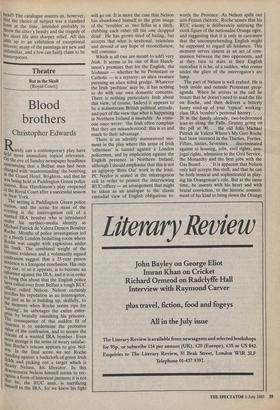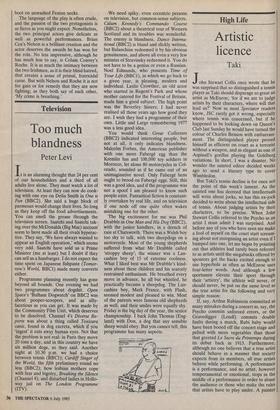Theatre
Rat in the Skull (Royal Court)
Blood brothers
Christopher Edwards
arely can a contemporary play have held more immediate topical relevance. On the eve of Sunday newspaper headlines announcing that a Belfast man had been Charged with `masterminding' the bombing at the Grand Hotel, Brighton, and that he Was being held at Paddington Green police station, Ron Hutchinson's play reopened at the Royal Court after a successful season in New York.
The setting is Paddington Green police station, and the scene for most of the evening is the interrogation cell of a wanted IRA bomber who is introduced under his mythico-media identity as Michael Patrick de Valera Demon Bomber Roche. Months of police investigation led to a North London bedsitting-room where Roche was caught with explosives under his bunk. The combined weight of the forensic evidence and a voluntarily signed Confession suggest that a 25-year prison sentence is a foregone conclusion. His only !'vay out, or so it appears, is to become an informer against the IRA, and it is in order Lt° bring this about that the English police nave called over from Belfast a tough RUC 9flicer called Nelson. Nelson certainly Justifies his reputation as an interrogator, but just as he is building up, skilfully, to tf, le moment when Roche seems ripe for tu.ruirig', he sabotages the entire enter- .1?.,r.ise by brutally assaulting his prisoner. !tie consequence of this sudden fit of violence is to undermine the probative value of the confession, and to secure the release of a wanted IRA bomber. Even Tore strange is the sense of weary satisfac- tion Roche's release appears to give Nel- scm. In the final scene we see Roche standing against a backcloth of green Irish fields and picking out a target which is early . ari..
Nelson, his liberator. In this
denouement Nelson himself seems to rec- ognise a form of historical justness; it is not at he, the RUC man, is sacrificing rurnself to the IRA, for we know his fight
will go on. It is more the case that Nelson has abandoned himself to the grim image of the `troubles' as `two fellas in a ditch, clubbing each other till the one dropped dead'. He has grown tired of hating, but accepts that what is irrational, relentless and devoid of any hope of reconciliation, will continue.
Which is all (we are meant to add) very Irish. It seems to be one of Ron Hutch- inson's premises that for the English, the Irishman — whether he be Protestant or Catholic — is a mystery; an alien creature pursuing an alien tribal grudge. Whatever the Irish `problem' may be, it has nothing to do with our own domestic concerns. There is nothing particularly Irish about this view, of course. Indeed it appears to be a mainstream British political attitude, and part of the view that what is happening in Northern Ireland is insoluble. As some- one once wrote: 'the Irish often complain that they are misunderstood; this is so and much to their advantage.'
There is an adroitly manoeuvred mo- ment in the play where this sense of Irish `otherness' is turned against a London policeman, and by implication against the English presence in Northern Ireland, although I should emphasise that this is not an agitprop `Brits Out' work in the least. PC Naylor is seated in the interrogation cell in order to protect the interviewing RUC officer — an arrangement that might be taken as an analogue to the classic custodial view of English obligations to- wards the Province. As Nelson spills out anti-Fenian rhetoric, Roche senses that his RUC enemy is deliberately satirising the stock figure of the nationalist Orange ogre, and suggesting that it is only in caricature that the uncomprehending English might be supposed to regard all Irishmen. This moment serves almost as an act of com- munion between the two opponents, and as they turn to stare at their English custodian it is he, of a sudden, who comes under the glare of the interrogator's arc lamp.
The part of Nelson is well crafted. He is both inside and outside Protestant prop- aganda. When he arrives in the cell he boasts that he doesn't need to read the file on Roche, and then delivers a bitterly funny send-up of your `typical' working- class IRA bomber's personal history: ‘. . . 26 in the family already, two-bedroomed lean-to along the Falls, Granny going on the pill at 90. . . the old fella Michael Patrick de Valera Where's My Giro Roche had been interned in the Thirties, Forties, Fifties, Sixties, Seventies. . . discriminated against in housing, jobs, civil rights, con- jugal rights, admission to the Civil Service, the Monarchy and the best jobs with the Gas Board. . .' It is apparent that Nelson only half accepts this stuff, and that he can be both ironical and sophisticated in play- ing his Orangeman's role. But at the same time, he assents with his heart and with brutal conviction, to the historic commit- ment of his kind to bring down the Orange boot on unwashed Fenian necks.
The language of the play is often crude, and the passion of the two protagonists is as fierce as you might expect. Nonetheless, the two principal actors give delicate as well as powerful performances. Brian Cox's Nelson is a brilliant creation and the actor deserves the awards he has won for the role. No less impressive, although he has much less to say, is Colum Convey's Roche. It is as much the intimacy between the two Irishmen, as it is their blind hatred, that creates a sense of primal, fratricidal curse. But with Nelson and Roche it is not for gain or for remedy that they are now fighting; as they both say of each other, 'My crime is breathing.'



















































 Previous page
Previous page